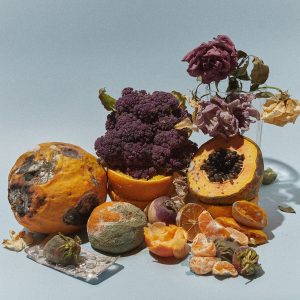
Review Kiko Dinucci – Rastilho
After having an operation on his leg following a skateboard accident, Kiko Dinucci made the guitar his partner for the long days he spent lying down. The heavy electric guitar rested and from Kiko’s re-encounter with the acoustic emerged Rastilho.
Known for his work with seminal bands Metá Metá and Passo Torto, it is hard to tell exactly how many records Kiko has already released, such his prolificacy. Though we do know that Rastilho is his third solo album after Cortes Curtos (2017) and Pastiche Nagô (2008), and that his hands went through much of what is inventive in contemporary Brazilian music, notably Elza Soares’ A Mulher do Fim do Mundo, Jards Macalé’s Besta Fera and collaborative releases with Juçara Marçal, Douglas Germano and Alessandra Leão.
All of these works have the signature of Kiko’s guitar. A sound that might be inspired by João Gilberto, Baden Powell, Rosinha de Valença or even Fugazi, but is a clearly authorial way of playing the guitar. In Rastilho, the guitarist re-interprets probably the most central instrument of Brazilian music. As Douglas Germano says, Kiko traces a new path for Brazilian guitar, an explosive gunpowder fuse (“rastilho” means fuse in Portuguese).
Reverb, echo and “defects” such as fingernail scratches, grunts and the sounds of strings hitting the fret board are part of Kiko Dinucci’s characteristic dirty sound and are present on this album, recorded direct to analogue tape. It’s an ode to São Paulo, where “everything is distorted and things are wrong but somehow it works”, he says.
Not for nothing, Rastilho starts off with “Exu Odara” (a song traditionally performed in candomblé houses). Exu is the orisha that traces tortuous paths, while “Olodé” is dedicated to another orisha, Oxosi, and is accompanied by the strong choir of Juçara Marçal, Dulce Monteiro, Maraísa and Gracinha Menezes.
“Tambú e Candongueiro” and “Gaba” also has deep references to African culture. The first one takes its names from two drums introduced to Brazil by Bantu slaves and, as the researcher GG Albuquerque points out, dialogues with Mali and Gambia’s traditional instrument, the kora. Gaba was an Angolan princess enslaved, tortured, and brought to Brazil in the 17th century who led a movement for resistance and freedom.
Resistance is a feeling that has ran through much Brazilian music of the last decade, and Rastilho is not different. “Marquito” is a song named after a guerrilla fighter killed in 1969, during the military dictatorship, and sets up a Western atmosphere reminiscent of critically-acclaimed Brazilian film Bacurau (2019). “Dadá”, in its turn, is named after a bandit from late 19th century north-eastern Brazil. Ava Rocha participates in the song, with moans and guttural vibrations.
OGI is another important name that collaborates on Rastilho. The rapper sings in “Veneno”, with lyrics about violence, devil, Jesus and hell. These subject can also be found on “Febre do Rato”, which tells of an uncomfortable scenario on São Paulo’s streets and at an evangelical church. In both, the sound of heavy bass strings lead us. Inspired by Michael Jackson and James Brown, Kiko has always tried to create a marking, a floor to build up his samba, based on groove. It might not seem, but it is and it has always been samba – maybe a rough, rotten samba –, as he states out in an interview to Thiago França, his longtime partner.
Rastilho ends with the title track (the recent Mais Um re-release features two bonus tracks on the digital release). The track can be interpreted by the album’s cover, by Pablo Saborido: a tropical but putrid Brazil that 2020 has exposed. “The dying dance / Flies already cover us / Nobody can stop/ Neither faith, love or luck / Let’s explode”, says the lyrics of “Rastilho”.
Rastilho is out now on Mais Um
Follow Sounds and Colours: Facebook / Twitter / Instagram / Mixcloud / Soundcloud / Bandcamp
Subscribe to the Sounds and Colours Newsletter for regular updates, news and competitions bringing the best of Latin American culture direct to your Inbox.

